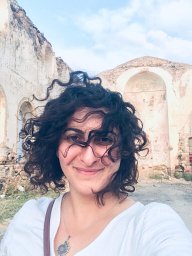“It continued snowing all morning, while Ka walked the streets playing the intrepid reporter—visiting coffeehouses packed with unemployed Kurds, interviewing voters, taking notes—and it was still snowing later […].”[I]
This sentence is from Snow, described as “the first and the last political novel” by its Nobel Laureate author Orhan Pamuk. The book created a public debate even before its publication. After having appeared in bookstores in January 2002, it became a bestseller by gaining great attention derived from its provocative content with apparent references to the existing debates about politics in Turkey. Consequently, when the book was translated into English, the translator, Maureen Freely, notified the prospective readers in her review that “how you read that tragedy depends very much on what your politics are and how much you know about recent Turkish history.”[ii]
Pamuk argues that he creates a “microcosm” that stands for Turkey by miniaturizing cutting edge issues to a local story set in the fiction city Kars.[iii] Similarities of this imagined town with the actual city Kars, located in northeast Turkey near the Armenian border, made Snow even more inflammatory for those who engaged in the public debate that it caused. Inspired by this debate, I conducted ethnographic fieldwork in 2009 to look at how people living in Kars, who were represented in the book, responded to the cutting edge questions on Turkey raised in this book.
Snow deals with many issues that also attract anthropological curiosity including Islam, secularism, gender, nationalism, and ethnicity. Orhan Pamuk wrote his book between the years 2000 and 2001, and he visited Kars many times in this period. During his visits, he introduced himself as a journalist and collected information from the residents of the city about their way of life. As an ethnographer, while following Pamuk’s route in Kars, I investigated what people think retrospectively concerning the aforementioned critical problems of Turkey from their positions and within the spatial and historical context that surrounds them.
A Kurdish lawyer I met in Kars during my fieldwork, referred to the line I quoted above when he learned that I was doing research about Snow. For him, Pamuk had bad intentions aiming separatism while emphasizing people’s ethnicity:
“What grabbed my attention in the book is that he [Pamuk] says, ‘I went inside a teahouse, I saw unemployed young Kurds.’ He underlines this on purpose. Now, I wonder according to the measurement did Orhan Pamuk concludes whether they are Turkish or Kurdish? We can understand this as locals. We are a family here. I think it is because he doesn’t know the city well enough. [He assumes] that only Kurdish people are living in Kars.”
Although there were many passages about Kurds in Snow, this particular sentence became well known after it had been articulated in a panel discussion broadcasted on TV in 2002, when the book was published. The show was broadcasted on the only local TV station, Serhat TV (or Borderland TV), owned by the previous mayor – who also contributed to the promotion of Snow in Kars by selling it at half price to his fellow citizens. During the TV show, speakers came up to agree that the publication of the book was beneficial to Kars because it would cause publicity and attract attention for investments, which would eventually bring economic development of the city. This argument was indeed the rationale behind the mayor’s contribution to the publicity of the book. However, the moderator of the program did not have the same opinion because he thought that the author insulted people in Kars. He argued that the book intended to divide Karsians based on their ethnic identities, precisely because of the description of ‘unemployed young Kurds’ who spend their time at coffee houses. The moderator was red immediately after the show ended because he deviated from the broadcasting policy of the TV station. I met this moderator, whom I call Yalçın, to learn more about his ideas.
Yalçın was a Yerli, which is a made up ethnic category in Kars. It is constructed when people already living in Kars felt the need to ascribe a collectivity to themselves different from the migrants or émigrés with various ethnic backgrounds came to the city at the beginning of the 20th century, such as Azeris and Kurds. As a man in his 40s, Yalçın was publishing a one-person newspaper (meaning owned and produced by only one person, like many others in the town).
During our talk, Yalçın said that Snow did not have an impact on Kars at all, even though he lost his job because of his opinions on the book. He was against the book because of two reasons. First, he believed that “the book was written upon the purchase order of Western imperialist powers, which are against Turkey’s membership to the EU.” He said, thanks to the book Westerners would be able to argue in the future, “it is not us, but it is your Nobel laureate author, your journalist or your TV station, who confirms [injustices against minorities]. It is not Armenian, not Greek, not Jewish but your nationals!” Second, he said, the underlying aim of publishing Snow was to provoke the Kurdish community in Turkey, which, he thought, was ‘the weakest link’ in the society. However, he was careful to make a distinction between the different Kurds. Referring to the conflict between the Kurdish armed movement the Kurdistan Worker’s Party (Partiya Karkerên Kurdistanê) and the Turkish Armed Forces that was going on since the 1980s, he said: “When a şehit (martyr soldier) funeral comes to Kars, Kurds, Azeris, etc., pray for him altogether. Nobody says that ‘your fellows killed this man.’ If you go and look, you will see that Kurds are the majority among the participants of such funerals in Kars and they are the ones who cry the most.”


Yalçın’s ‘selective racism,’ makes exceptions for individuals in the process of identification and leave room for a possible dialogue with those individuals while excluding the rest for good.[iv] Therefore, it was not surprising for me to hear that he became a member of the nationalist Worker’s Party (İşçi Partisi) after I left the eld. While making a selection among Kurds, his remark also implies that ordinary Kurdish people can be associated with terrorism when they fail to perform what they are expected to. An example was again a journalist, whom I call Hikmet.
After studying journalism at the university and working for the pro-Kurdish daily Gündem in the capital city Ankara, Hikmet came back to his hometown Kars. Speaking many languages including his native Kurdish, Hikmet started to work as the Eastern Anatolia correspondent of a national news agency. Having no ties with local newspapers allowed him to be outspoken. Therefore, he could cover stories that were not covered before. He openly wrote about the improper practices of local administrators – not only of the elected mayor but also of the centrally assigned governor. Having published in the national media made him ‘popular’ in Kars in a short time. Some of his fellow citizens and colleagues in Kars accused him of being a trained guerrilla. Hikmet did not take these reactions seriously. He was proud that his critically engaged professional practice was a change maker in media practices in Kars. Accusations against him, in this sense, were not related to his ethnicity as a Kurd, but rather they were defensive responses of a kind of local journalism tradition that served to maintain power relations in the city.
During my stay in Kars in 2009, a decade after Pamuk’s observations, unemployed young men were not anymore spending their time at coffeehouses. Instead, they preferred Internet cafés, where I noticed A4 print outs warning with bold capital letters: “It is not allowed to visit websites of separatist organizations.” A decade after my observations, however, what happens to the power relations in the city as well as to its local journalists are open to exploration.
(This essay is composed of excerpts from my unpublished master’s thesis submitted to Middle East Technical University, Ankara, in 2010 under the supervision of Prof. Dr. Sabine Strasser)
[i] Orhan Pamuk, Snow, trans. Maureen Freely (New York: Knopf, 2004), 10. [ii] Maureen Freely, “Snow Business,” Cornucopia 2002, no: 26(5): 27-56.
[iii] Jörg Lau, “Interview: Achte auf die Details des Lebens,” Die Zeit, October 12, 2006, https://www.zeit.de/2005/16/InterviewPamuk.
[iv] Gerd Baumann and Andre Gingrich, eds. Grammars of Identity / Alterity: A Structural Approach. (New York: Berghahn Books, 2005), 40.



